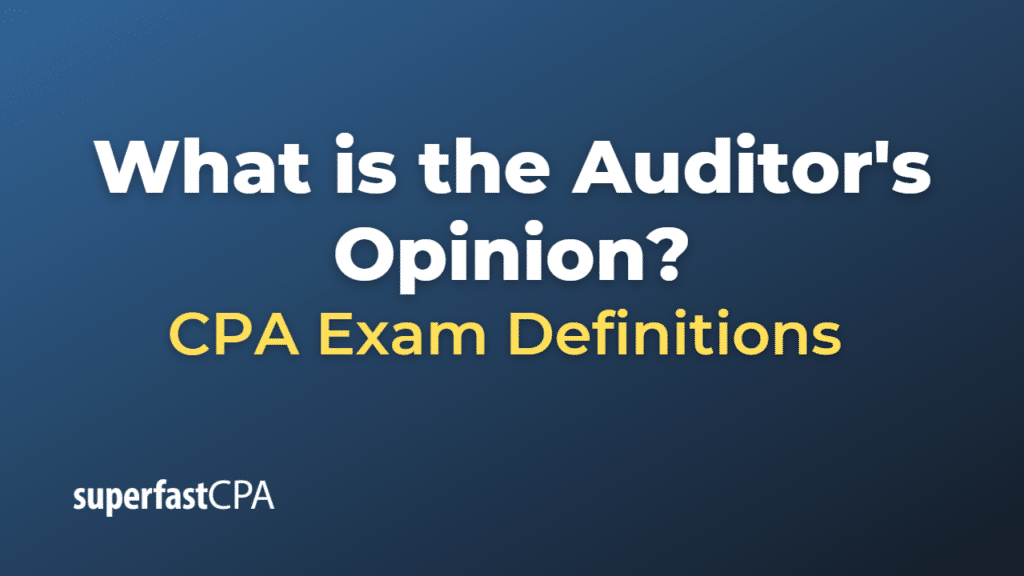Auditor’s Opinion
An auditor’s opinion, also known as the audit opinion or auditor’s report, is a statement provided by an independent auditor after examining a company’s financial statements. The opinion reflects the auditor’s assessment of the accuracy, fairness, and compliance of the financial statements with the applicable accounting standards and regulations. There are four main types of audit opinions:
- Unqualified Opinion (Clean Opinion): This is the best type of opinion a company can receive. It indicates that the auditor believes the financial statements present a true and fair view of the company’s financial position and results and are in compliance with the relevant accounting standards.
- Qualified Opinion: A qualified opinion means that the auditor has found some issues with the financial statements, but these issues are not pervasive or severe enough to invalidate the entire report. The issues could be due to deviations from accounting standards, limitations in the scope of the audit, or any other specific matters that the auditor believes should be highlighted.
- Adverse Opinion: An adverse opinion is a severe judgment on the financial statements. It indicates that the auditor believes the financial statements contain significant misstatements, errors, or misrepresentations, and as a result, they do not present a true and fair view of the company’s financial position and results. This type of opinion can have serious consequences for a company.
- Disclaimer of Opinion: A disclaimer of opinion means that the auditor is unable to form an opinion on the financial statements due to various reasons, such as insufficient information, limitations in the scope of the audit, or conflicts of interest. In this case, the auditor is not expressing any assurance on the accuracy or fairness of the financial statements.
The auditor’s opinion can have a significant impact on the stakeholders’ perception of the company’s financial health and credibility. A clean opinion is generally a sign of good financial management, while an adverse or disclaimer of opinion can raise red flags and potentially impact the company’s reputation, access to credit, or stock price.
Example of the Auditor’s Opinion
Here’s an example of a simplified unqualified auditor’s opinion for a fictional company, XYZ Corporation:
Independent Auditor’s Report
To the Shareholders and Board of Directors of XYZ Corporation
We have audited the accompanying financial statements of XYZ Corporation, which comprise the balance sheet as of December 31, 2022, and the related statements of income, changes in shareholders’ equity, and cash flows for the year then ended, and a summary of significant accounting policies and other explanatory notes.
Management’s Responsibility for the Financial Statements
Management is responsible for the preparation and fair presentation of these financial statements in accordance with International Financial Reporting Standards; this includes the design, implementation, and maintenance of internal control relevant to the preparation and fair presentation of financial statements that are free from material misstatement, whether due to fraud or error.
Auditor’s Responsibility
Our responsibility is to express an opinion on these financial statements based on our audit. We conducted our audit in accordance with International Standards on Auditing. Those standards require that we comply with ethical requirements and plan and perform the audit to obtain reasonable assurance about whether the financial statements are free from material misstatement.
An audit involves performing procedures to obtain audit evidence about the amounts and disclosures in the financial statements. The procedures selected depend on the auditor’s judgment, including the assessment of the risks of material misstatement of the financial statements, whether due to fraud or error. In making those risk assessments, the auditor considers internal control relevant to the entity’s preparation and fair presentation of the financial statements to design audit procedures that are appropriate in the circumstances but not for the purpose of expressing an opinion on the effectiveness of the entity’s internal control. An audit also includes evaluating the appropriateness of accounting policies used and the reasonableness of accounting estimates made by management, as well as evaluating the overall presentation of the financial statements.
Opinion
In our opinion, the financial statements referred to above present fairly, in all material respects, the financial position of XYZ Corporation as of December 31, 2022, and its financial performance and its cash flows for the year then ended in accordance with International Financial Reporting Standards.
John Doe, CPA
Doe & Associates
Certified Public Accountants
[City], [Date]













